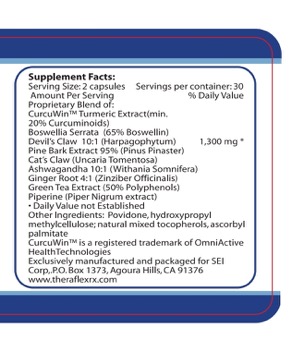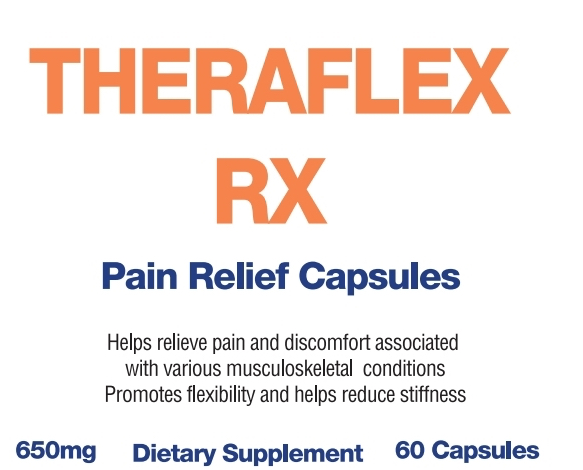
From the desk of Dr Robert Gross MD
Theraflex RX® Pain Relief Capsule Ingredients (This is a proprietary blend that includes these ingredients).
Curcumin (turmeric extract)
Curcumin, is an anti-inflammatory molecule in the turmeric root, a relative of ginger. Turmeric has been used for thousands of years as a medicinal preparation and a preservative and coloring agent in foods. Curcumin was isolated as the major yellow pigment in turmeric; chemically diferulomethane, and has a polyphenolic molecular structure similar to other plant pigments (eg. extracted from grapes in wine (resveratrol), or in green tea (catechins) or in certain fruit juices (blueberries, strawberries, pomegranates etc.) This polyphenols share in common anti-oxidant and anti-inflammatory properties with associated health benefits
We use CurcuWin® because curcumin has poor solubility and absorption, large doses of standard curcumin powder are typically needed for health benefits. Several companies have introduced enhanced forms of curcumin to address the issue of bioavailability. However, the study strengths vary based on a number of factors including study design, population, fed state, and number and variety of outcome measures. These variabilities and only testing a single enhanced ingredient against a standard curcumin powder make it difficult to directly compare one form against another.
In a well-controlled human clinical trial—the first curcumin study of its kind—comparing commercial curcumin products, CurcuWIN increased relative absorption of total curcuminoids 46-times over standard curcumin. Produced using OmniActive’s proprietary UltraSOL Nutrient Delivery System, CurcuWIN contains a minimum 20% curcuminoids in the same profile as found naturally in turmeric.
• One of many plant polyphenolics, curcumin is the Asian version of aspirin. Our wonder drug aspirin was originally purified from willow bark extracts that were used in European and American Indian traditional medicine to control inflammation. Eventually aspirin was synthesized by German chemists and developed by Bayer as one of the most successful drugs in the Western medicine cabinet. Today aspirin is used not only in pain remedies and other analgesic applications, but to control minor fever and inflammation and, at low doses, to prevent heart attack and stroke. Curcumin has been used in traditional Indian (Ayruvedic) and Chinese medicine for thousands of years largely because of its proven efficacy in treating conditions with inflammation. They also used it in foods as an effective food preservative, just as we use synthetic additives like BHA. These ancient civilizations have vast trial and error experience with many different herbal remedies and food preparations and they selected curcumin as a food additive and major tool for medicinal use based on efficacy- not superstition.
• Curcumin is recognized by the National Cancer Institute (NCI) and academic investigators around the world as a potent anti-carcinogen
Boswella Serrat
Boswellia Serrata is a gum resin extracted from a tree, which is sometimes burnt (the entire species of Boswellia is commonly known as Frankinsence) as an aromatic or otherwise administered as medicine. It has most usage for medicine in Ayurvedic medicine, some reading into Traditional Chinese Medicine, and its usage extends to the Middle East and other tropical regions.
Boswellia Serrata, via its active boswellic acids, appears to be a novel inhibitory of a pro-inflammatory enzyme called 5-Lipoxygenase and may possess other anti-inflammatory effects (such as nF-kB inhibition, which are not as novel). These anti-inflammatory effects have been investigated for their benefits in osteoarthritis (OA), and it appears that oral Boswellia supplements can suppress pain and immobility associated with OA quite significantly with the effects taking as little as a week to occur. The studies are well conducted, but funded by the producers of the tested supplements. There are limited non-funded interventions with Boswellic for this claim, but they seem to agree with the battery of funded study in effect size.
Devil's Claw
Devil's claw is an herb. The botanical name, Harpagophytum, means "hook plant" in Greek. This plant gets its name from the appearance of its fruit, which is covered with hooks meant to attach onto animals in order to spread the seeds. The roots and tubers of the plant are used to make medicine.
Devil's claw is used for "hardening of the arteries" (atherosclerosis), arthritis, gout, muscle pain (myalgia), back pain, fibromyalgia, tendonitis, chest pain, gastrointestinal (GI) upset or heart burn, fever, and migraine headache. It is also used for difficulties in childbirth, menstrual problems, allergic reactions, loss of appetite, and kidney and bladder disease.
Some people apply devil's claw to the skin for injuries and other skin conditions.
Devil's claw contains chemicals that might decrease inflammation and swelling and resulting pain.
Pine Bark Extract
Pycnogenol is derived from the bark of the French maritime pine tree. Studies have shown that it is effective in treating many inflammatory conditions, skin disorders, and poor blood circulation because of its antioxidant and antiinflammatory properties. It was also shown to be effective in treating erectile dysfunction when used in combination with L-arginine. Animal studies indicate that pycnogenol exhibits protective effects against cardiac toxicity caused by the chemotherapy drug doxorubicin.
Cat's Claw
In laboratory experiments, compounds found in cat’s claw stimulate the activity of specific immune cells known as phagocytes and T-helper cells. Cat’s claw may also be able to slow some of the processes that cause inflammation, enhance DNA repair, and may reduce certain chemotherapy side effects. However, most of these effects are observed in lab studies, with only a few small studies in humans reported.
Ashwagandha
Ashwagandha is a popular Ayurvedic herb. Studies show that it has anti-inflammatory effects. Ashwagandha also relaxes the central nervous system in animals. Laboratory studies found that ashwagandha kills some cancer cells and enhances some immune cells possibly by damaging the cancer cells’ ability to generate the energy it needs to reproduce. Ashwagandha also reduces the level of an important antioxidant in tumor cells, which may enhance the ability of radiation therapy to kill those cells. However, this herb may induce abortion, so pregnant women should not use it.
Ginger Root
Ginger root contains compounds that may help relieve or prevent nausea and vomiting. These substances can increase the flow of saliva and digestive juices and may also help calm the stomach and intestine. Scientists are still unsure exactly how ginger exerts these effects. In humans, studies have shown that eating fresh ginger (but not dried ginger) in high doses can “thin” the blood by preventing the platelets from sticking together. In addition, laboratory studies suggest that ginger can protect brain cells from the plaques that cause Alzheimer’s disease, but this effect has not been studied in humans.
Green Tea Extract
Green tea contains substances called polyphenols, which scientists think contribute to its anti-cancer activity. Laboratory studies of one polyphenol, catechin epigallocatechin-3-gallate (EGCG), show that it may interfere with several of the processes involved in cell replication, causing tumor cell death (apoptosis). It also might slow the formation of blood vessels around tumors. Epigallocatechin (ECG), another polyphenol, stops leukemic cells from multiplying in laboratory studies. As a proven antioxidant, green tea may repair cell damage, but whether it can prevent cancer is uncertain. It is also unknown how it might help protect the heart, but it reduces LDL (“bad”) cholesterol and increases HDL (“good”) cholesterol. Tannins present in green tea generally have antibacterial properties.
Animal studies indicate that oral consumption of green tea extract during fasting can increase the risk of toxicity. Human studies are needed.
Piperine
The primary value of piperine in health supplements is its ability to enhance the bioavailability of some other vitamins and minerals. This mechanism is still being studied, but piperine is known to inhibit the enzymes P-glycoprotein and CYP3A4 in humans. These enzymes are involved in the metabolism and transport of various metabolites. Animal studies also show that piperine inhibits CYP 450 enzymes that metabolize many drugs. In particular, piperine may increase the bioavailability of curcumin by a factor of 20.
